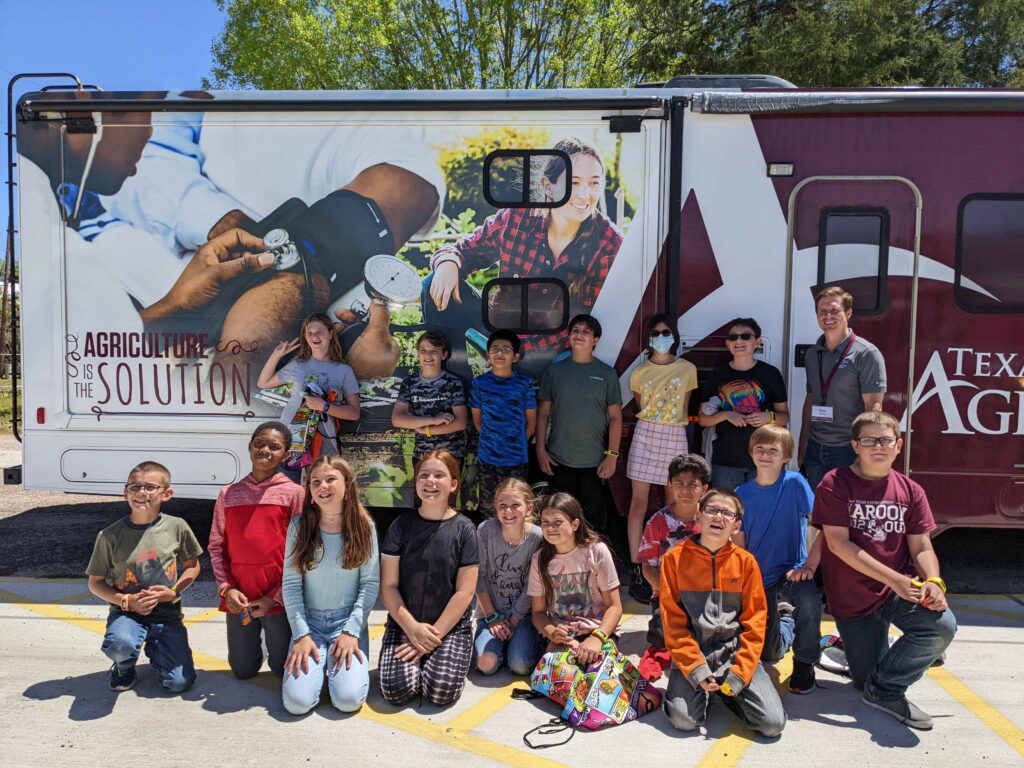Driving improved health and research across Texas
Mobile Health Assessment Centers serve rural population centers
As research seeks new knowledge to advance community health, a new fleet of specialized vehicles has hit the streets to ensure that the needs of Texans, especially those in rural areas, are understood.
A fleet of four Mobile Health Assessment Centers [project page closed] from the Texas A&M AgriLife Institute for Advancing Health Through Agriculture, IHA, aims to put the functions of a brick-and-mortar research study center on wheels with these specially designed vehicles.

The mobile centers reduce obstacles to participation in scientific studies by bringing research capabilities into communities that might otherwise miss out.
Equipped with clinical assessment space, an exam room, phlebotomy stations, lab counters and indoor/outdoor kitchens, these vehicles can travel statewide, and even beyond, allowing for a broad data collection. This ensures a thorough understanding of rural populations’ complex health challenges and fosters new collaborations.
Collaboration with the Change Club in New York and Texas
The mobile centers have been put to work in advancing community health through a joint collaboration between the IHA and the Change Club. Funded by the National Institutes of Health, Rebecca Seguin-Fowler, Ph.D., associate director for Healthy Living at the IHA, is leading this community-based civic engagement project in New York and Texas. The project examined how positive changes in food and physical activity-built environments led by local resident groups affect cardiovascular disease risk factors such as diet, exercise, body weight and blood pressure.
“The IHA’s Healthy Living research team traveled with the mobile centers to three towns in Trinity and Harrison Counties to meet with community partners and to engage rural residents in the Change Club project,” Seguin-Fowler said. “The MHACs were used at local grocery stores to raise awareness about the Change Club project and engage with community members. The research team collected contact information from interested individuals for project recruitment.”
The Healthy Living team attended the Wiley College Health Fair to promote the project to college students.
The project has been implemented in six rural Texas locations and enrolled more than 2,500 people.
Optimizing the effectiveness and impact of an AgriLife Extension program
The Healthy School Recognized Campus, HSRC, is another initiative in which the mobile centers host Texas A&M AgriLife Extension Service programs for their students, staff and parents/guardians. Schools recognized by this designation demonstrate a lifelong commitment to supporting and encouraging health.
Jacob S. Szeszulski, Ph.D., a member of the IHA’s Healthy Living team, leads this statewide collaboration between AgriLife Extension and the IHA. In their work, Szeszulski and his research team have traveled to several counties in East Texas to interview and survey program implementers, including teachers, principals and nurses, participating in the HSRC project in East Texas schools.
“It is thanks to these mobile centers that the project team was able to bring research capabilities to these rural schools,” Seguin-Fowler said.
Program implementers taught lessons from the AgriLife Extension’s Learn, Grow, Eat and Go! and Walk Across Texas programs. Students and implementers both expressed positive experiences with the programs. Interview and survey results informed the current AHA-funded HSRC Elementary School study and the NIH-funded Strong Teens for Healthy Schools middle school study. These studies are focused on decreasing cardiovascular risk factors in youth while improving the delivery of school-based health programs.
Mobile clinical research vehicles
The vehicle fleet includes two large-scale and two smaller units to accommodate a variety of research priorities. IHA leadership is preparing a cost model proposal to expand access to its cutting-edge mobile centers to internal and external collaborators.
As the IHA’s fleet of mobile centers prepares to roll out across Texas, the institute is committed to ensuring that scientific advancement knows no bounds in the Lone Star State and beyond.
With wheels in motion, the future of health research in Texas is on the move – and poised for nationwide progress.







